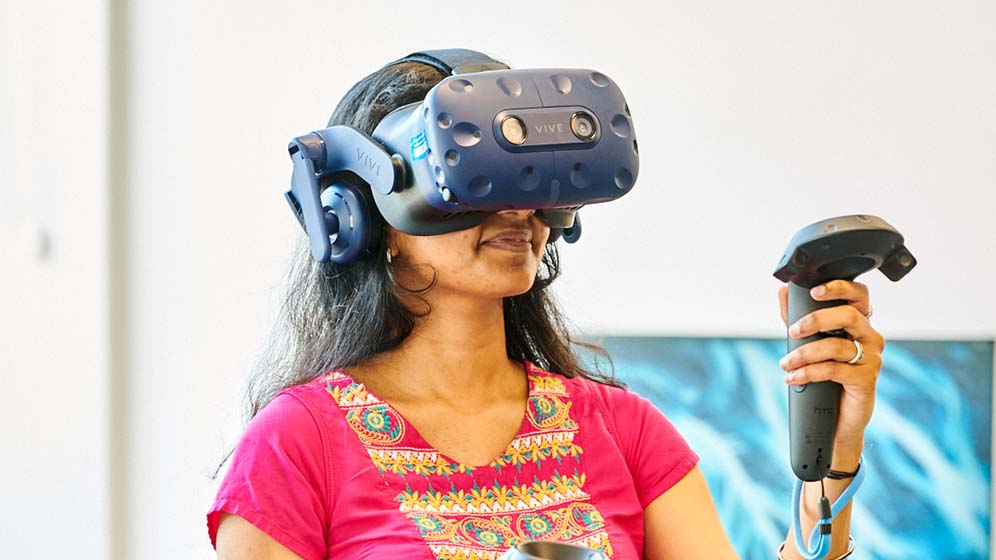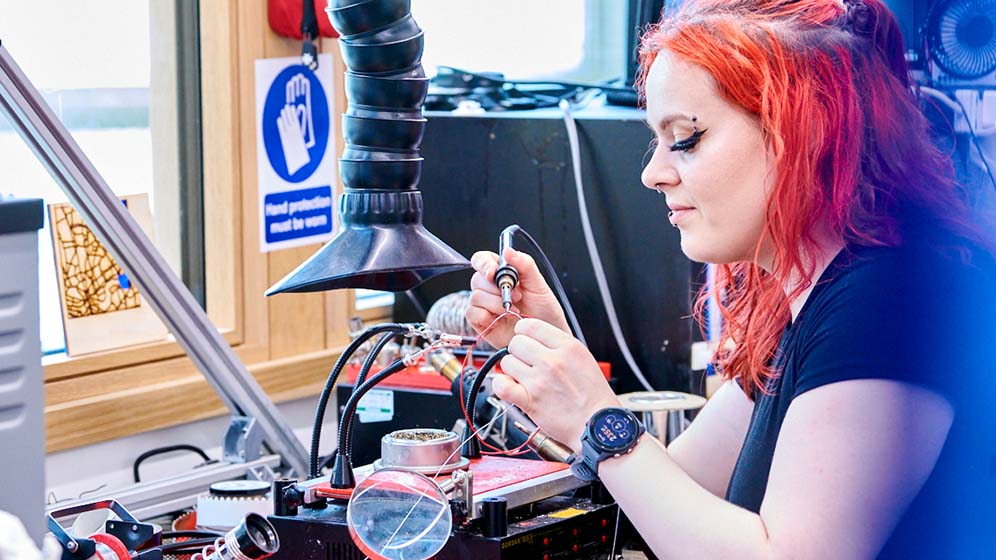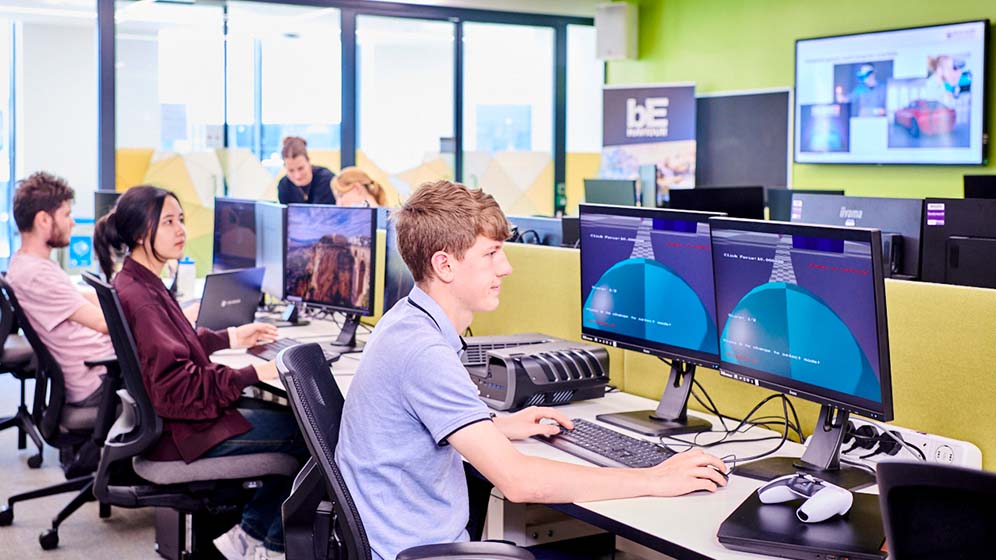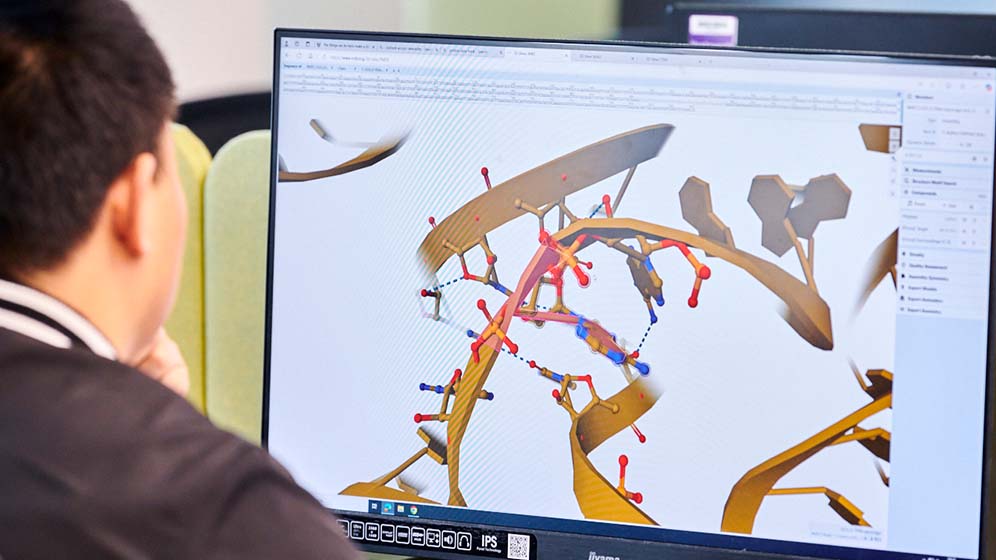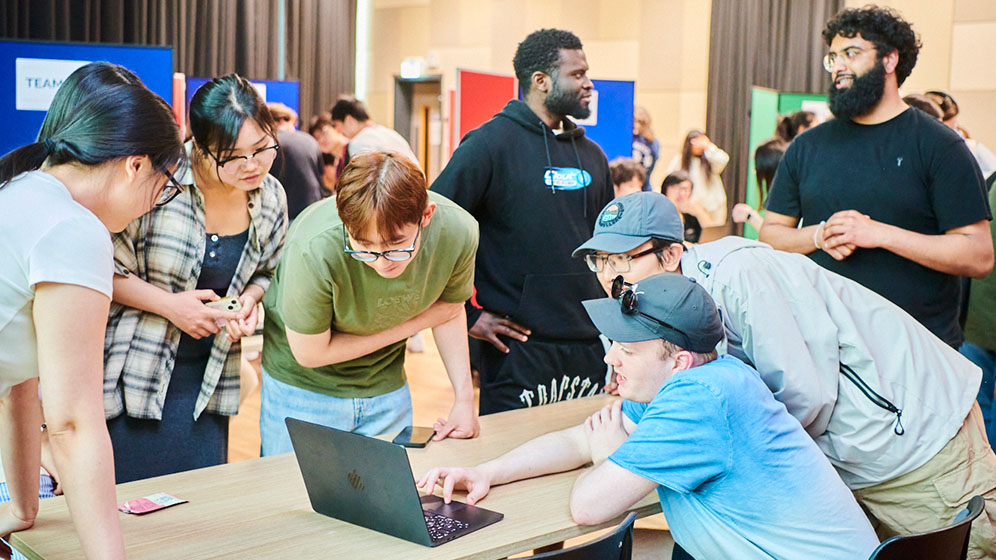Computer Game Engineering MSc
A technical Master's degree that transforms your passion for programming and games into industry-ready skills. Excel in game engine technologies, real-time graphics and simulation programming.
You are currently viewing course information for entry year:
Start date(s):
- September 2026
Overview
This advanced Master's in game development gives you the skills and experience to thrive. It has been designed in collaboration with high-profile industry leaders and computer game innovators. We produce graduates with the potential to become future leaders in the global computer games industry.
Stand out in the job market with deep technical expertise in game engineering. You'll experience intensive programming in C++ and work with industry-standard tools and technologies. You'll gain an international perspective on the latest advancements in computer game development.
You'll benefit from:
- an industrial advisory board made up of high-profile UK game companies
- the opportunity to meet game developers from across the UK
- a technical focus on game engineering and programming
We are a hub of digital innovation. You'll benefit from our:
- leadership of the National Edge AI Hub, next-generation innovations via edge computing
- recognition as an Academic Centre of Excellence in Cyber Security, supported by the National Cyber Security Centre and the EPSRC
- direct link with the UK's National Innovation Centre for Data
- partnership with The Alan Turing Institute, the UK’s national institute for data science and AI
Our expert academics bring cutting-edge computer game research and real-world industry experience to the classroom. Benefit from their insights of leading game studios and their strong connections across the sector.
This course has been developed in partnership with our Industrial Advisory Board (IAB). The IAB is made up of industry and alumni who are leaders in game engineering and development. This ensures the course remains relevant and aligned with industry needs.
Our Board has representatives from:
- Nvidia
- Epic Games
- Ubisoft
- Rockstar
- Sumo
- Digital Unity
READ MORE
Important information
We've highlighted important information about your course. Please take note of any deadlines.
Please rest assured we make all reasonable efforts to provide you with the programmes, services and facilities described. However, it may be necessary to make changes due to significant disruption, for example in response to Covid-19.
View our Academic experience page, which gives information about your Newcastle University study experience for the academic year 2025-26.
See our terms and conditions and student complaints information, which gives details of circumstances that may lead to changes to programmes, modules or University services.
Qualifications explained
Find out about the different qualification options for this course.
An MSc is a taught Master’s degree. It usually involves the study of a science-related subject. It typically includes:
- subject-specific taught modules
- a dissertation or research project of approximately 15,000 – 18,000 words
You'll usually study an MSc full-time over 12 months.
A Master of Science is typically awarded for the successful completion of 120 credits of taught modules and a 60-credit dissertation or research project.
Find out about different types of postgraduate qualifications.
What you'll learn
There are three phases in the course.
Phase one
Phase one (60 credits) will introduce core knowledge and skills through modules in:
- programming
- graphics
- game technologies
You'll also undertake a substantial amount of supervised and unsupervised practical work.
Phase two
During phase two (40 credits), we emphasise the practice of computer game development through modules in:
- skills, tools and techniques for the game industry
- the development of a computer game (team exercise)
- industry seminars from across the games industry
Phase three
Phase three (80 credits) is the individual system development or research project.
Modules
You will study modules on this course. A module is a unit of a course with its own approved aims and outcomes and assessment methods.
The module information below is intended to provide an example of what you will study.
Our teaching is informed by research. Course content changes periodically to reflect developments in the discipline, the requirements of external bodies and partners, and student feedback.
Full details of the modules on offer will be published through the Programme Regulations and Specifications ahead of each academic year. This usually happens in May.
To find out more please see our terms and conditions.
Optional modules availability
Some courses have optional modules. Student demand for optional modules may affect availability.
How you'll learn
You’ll be taught using a range of methods, including:
- lectures
- seminars
- practical labs
- workshop sessions
- group work
We encourage students to deepen their understanding through guided independent reading and study.
Depending on your modules, you'll be assessed through a combination of:
- Design or creative project
- Dissertation
- Professional skills assessments
- Practical lab report
- Report
The course culminates in a project and dissertation in computer game engineering. This five-month project gives you a real opportunity to develop your knowledge and skills.
You'll also gain work experience in a research or development team. You can carry out your project in:
- one of the research groups at Newcastle University
- an industry laboratory
- your place of work
You'll have one-to-one supervision from an experienced member of staff. You'll also be supported by supervision from industry partners as required. For your project you may collaborate with developers in the game industry who make up the course's Industrial Advisory Board.
Throughout your studies, you’ll have access to support from:
- academic staff
- personal tutors and research supervisors
- our University Student Services Team
- student representatives
- peers
You'll also be assigned an academic member of staff, who will be your personal tutor throughout your time with us. They can help with academic and personal issues.
Your teaching and learning is also supported by Canvas. Canvas is a Virtual Learning Environment. You'll use Canvas to submit your assignments and access your:
- module handbooks
- course materials
- groups
- course announcements and notifications
- written feedback
The staff delivering this course are internationally recognised for their contributions to:
- online gaming
- graphics and simulation
- artificial intelligence
- programming
- human-computer interaction
The School of Computing has an outstanding track record of research related to the development of computer game technologies. The content of this Master's is based on cutting-edge research led by our academic staff.
Our staff also have strong links with industry leaders, many of which actively recruit our graduates.
Your development
Throughout the course, you will have the opportunity to meet and learn from industry experts and our Industrial Advisory Board.
You'll communicate your ideas to visiting industry experts. This gives you the chance to network, but to also develop professional skills needed in the industry.
You will hone your professional, research and practical skills through specialist modules that aim to create well-rounded graduates.
You'll adopt industry-standard practices, using agile software development and version control. This ensures you're fully prepared for the professional environment. The practices you'll engage with are informed by real-world studios.
You'll also develop your own portfolio throughout the course, which will include:
- real-time graphics demo in C++ and OpenGL
- real-time physics and AI demo
- a game created as part of the team project using our PlayStation 5 dev kits
- your individual project with industry or leading research from the University
You will also have access to number of work experience opportunities through our links with industry and our Careers Service. This includes working with industry partners on live games as part of your final project.
Your future
Careers
Graduates from this course have gone on to undertake various roles within 15 months of graduation, including:
- Programmer at Coconut Lizard
- Associate Audio Programmer at Creative Assembly
- Systems Designer at Rockstar North
- Mechanics Programmer at TT Games
- Game Programmer at Ubisoft
- Game Programmer at Red Kite Games
- Game Designer at ByteDance
Our graduates have progressed into senior roles such as:
- Senior Open World Designer at Rockstar
- Technical Director at Electronic Arts
- Graphics Programmer at Remedy
Students also have the opportunity to take part in extra-curricular paid internships. These are organised through the Careers Service. Recent examples include:
- Programmer, Nosebleed Interactive
- Research Assistant (Inclusivity Game Jam), Newcastle University
- App Developer, Siemens Games
Further study
This course provides a route into PhD level study, offering a robust foundation in both theoretical and applied aspects of Computer Game Engineering. Graduates will be well-prepared to pursue advanced research opportunities and contribute to the academic community through doctoral programmes.
Industry links
Thanks to our strong industry connections, graduates are regularly recruited by leading game development companies.
You'll also have opportunities to network with employers through:
- events
- guest lectures
- collaborative projects
Our Industrial Advisory Board compromises representatives from companies including:
- Nvidia
- Epic Games
- Ubisoft
- Rockstar
- Sumo Digital
- Unity
Our Careers Service
Our expert Careers Service is here to help you take the next steps in your professional life. We will support you while you’re studying with us and for up to three years after you graduate.
You will have access to expert one-to-one advice and guidance through our campus careers centre and online, along with digital resources, workshops, networking opportunities, and careers and recruitment events.
We’ve been awarded 5 QS Stars for Student Employability (2025). Many of our degrees are shaped by strong links with national and international businesses. We are committed to helping you access real-world experience opportunities and develop key skills through paid work placements and internships.
Quality and ranking
All professional accreditations are reviewed regularly by their professional body
If you’re studying an accredited degree and thinking about working in Europe after you graduate, the best place to find current information is the UK Government’s guidance on recognition of UK professional qualifications in EU member states. This official resource explains whether your profession is regulated in another country, what steps you need to take, and which organisation you should contact.
Facilities
Gaming hardware and facilities
You’ll spend majority of your time in the Game Lab, a dedicated space for postgraduate students that mirrors a real studio environment.
The Lab offers brand-new, high-spec machines installed in summer 2025. Think, work, and collaborate like a professional developer.
Get hands-on experience with PlayStation 5 development kits. They can prepare you for the technical demands of working on next-gen platforms.
Virtual reality hardware is available for students working on relevant projects in phase three.
Urban Sciences Building
The School of Computing is based in the £58 million Urban Sciences Building (USB), a flagship development located on the £350 million Newcastle Helix regeneration site in the heart of Newcastle. It brings together:
- academia
- the public sector
- communities
- business and industry
Postgraduate student facilities
As a Master's student, you'll have access to specialist teaching spaces and facilities in the USB. These are only available to postgraduate students.
Wellbeing and inclusivity are at the heart of our School. The USB has several wellbeing spaces for students, including:
- The Retreat: A sensory space with relaxing stimuli to distract from busy student life.
- Wellbeing room: Designed for relaxation and quiet time. Here you can take a moment to breathe and unwind. It can also be used by students with special medical requirements.
- Prayer room: For all faiths and none, this space can be used for prayer or quiet reflection.
Fees, Funding and Scholarships
Tuition fees for 2026 entry (per year)
As a general principle, you should expect the tuition fee to increase in each subsequent academic year of your course, subject to government regulations on fee increases and in line with inflation.
Depending on your residency history, if you’re a student from the EU, other EEA or a Swiss national, with settled or pre-settled status under the EU Settlement Scheme, you’ll normally pay the ‘Home’ tuition fee rate and may be eligible for Student Finance England support.
EU students without settled or pre-settled status will normally be charged fees at the ‘International’ rate and will not be eligible for Student Finance England support. You may be eligible for a scholarship worth 25% off the international fee. Search our funding database.
If you are unsure of your fee status, check out the latest guidance here.
Scholarships
We support our EU and international students by providing a generous range of Vice-Chancellor's automatic and merit-based scholarships. See our searchable postgraduate funding page for more information.
What you're paying for
Tuition fees include the costs of:
- matriculation
- registration
- tuition (or supervision)
- library access
- examination
- re-examination
- graduation
Find out more about:
If you are an international student or a student from the EU, EEA or Switzerland and you need a visa to study in the UK, you may have to pay a deposit.
You can check this in the How to apply section.
If you're applying for funding, always check the funding application deadline. This deadline may be earlier than the application deadline for your course.
For some funding schemes, you need to have received an offer of a place on a course before you can apply for the funding.
Search for funding and scholarships
Find funding available for your course
Entry requirements
The entrance requirements below apply to 2026 entry.
Qualifications from outside the UK
English Language requirements
Admissions policy
This policy applies to all undergraduate and postgraduate admissions at Newcastle University. It is intended to provide information about our admissions policies and procedures to applicants and potential applicants, to their advisors and family members, and to staff of the University.
University Admissions Policy and related policies and procedures
Credit transfer and Recognition of Prior Learning
Recognition of Prior Learning (RPL) can allow you to convert existing relevant university-level knowledge, skills and experience into credits towards a qualification. Find out more about the RPL policy which may apply to this course
How to apply
Using the application portal
The application portal has instructions to guide you through your application. It will tell you what documents you need and how to upload them.
You can choose to start your application, save your details and come back to complete it later.
If you’re ready, you can select Apply Online and you’ll be taken directly to the application portal.
Alternatively you can find out more about applying on our applications and offers pages.
Apply Online
Open days and events
Find out about how you can visit Newcastle in person and virtually
Overseas events
We regularly travel overseas to meet with students interested in studying at Newcastle University.
Get in touch
Questions about this course?
If you have specific questions about this course you can contact:
Admissions Secretary
Telephone: +44 (0) 191 208 2736
Email: computing.admissions@ncl.ac.uk
School of Computing
ncl.ac.uk/computing
General enquiries
For more general enquiries, you could also complete our online enquiry form.
Application enquiries
If you've got a question about your application, send us an enquiry via the application portal you applied through.
If you haven't applied yet, you can send your questions via our enquiry form.
Live chat
Our Ncl chatbot might be able to give you an answer straight away. If not, it’ll direct you to someone who can help.
You'll find our Ncl chatbot in the bottom right of this page.
Keep updated
We regularly send email updates and extra information about the University.
Receive regular updates by email
